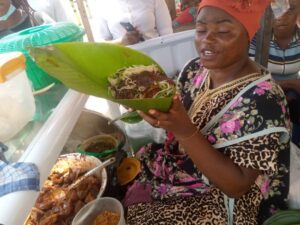Waakye is not only nutritious, it’s medicinal too – Nutritionist
 Madam Ophelia Dei Adubea, Nutritionist at the Nutrition Department, Ridge Hospital, says “waakye”, a popular Ghanaian dish is not only nutritious but medicinal.
Madam Ophelia Dei Adubea, Nutritionist at the Nutrition Department, Ridge Hospital, says “waakye”, a popular Ghanaian dish is not only nutritious but medicinal.
She said the meal was ‘health-giving’ when cooked with the sorghum bicolor leaves and packaged or served in the “katemfe” leaves also known as the miracle plant or sweet prayer plant.
Madam Adubea said this in an interview with the Ghana News Agency on local dishes to commemorate the Heritage Month.
She said sorghum bicolor leaves, also known as sorghum red leaves, were usually used as a colouring additive in the preparation of “waakye”, – a meal comprising rice and beans boiled together, but the “leaves add more than colour to the meal.”
Madam Dei Adubea said the “sorghum bicolor leaves have chemical components that help the human digestive system and also helps in free bowel.”
Those phytochemicals, especially antioxidants, which were extracted by adding a little saltpetre “kanwe” were critical for maintaining optimum health and wellbeing.
The antioxidants provide protection against diseases caused by oxidation stress such as cancer, diabetes, amongst others. It also prevents cell damage, according to health experts.
Research also shows that sorghum bicolor is used in the treatment of abdominal pain, epilepsy, and anaemia due to its high iron constituent.
The leaves contain calcium, which is good for bone health and anti-inflammatory properties.
She urged the public to always add vegetables to the meal and use the saltpetre in moderation.
“Whoever is eating ‘waakye’ should look out for saltpetre, too much of it can be harmful and they must always eat with vegetables,” Mad Dei Addobea cautioned.
Hajia Latifa Kande, a food vendor adjacent to the Registrar General Department, told the GNA that the leaves contained nutrients that boosted the production of blood.
“A lot of people love eating waakye and it is a good business to do but you must prepare it well to give your customers the best satisfaction,” she added.
Miss Abena Serwaa Mensah, a public servant, after buying some “wakye” from Hajia Kande, said the “katemfe” leaves gave a good flavour to the meal and made one salivate.
She said the leaves could preserve foods for longer period, adding that she had on countless occasions preserved waakye in the leaves from afternoon till evening.
The leaves are from a plant species in Africa called Thaumatococcus daniellii, known for being the natural source of thaumatin, an intensely sweet protein.
In West Africa, the plant is mostly cultivated for the leaves. The lamina of the leaves is used for wrapping foods while the petiole is used to weave mats. The entire leaf is also used for roofing.
Source: GNA
